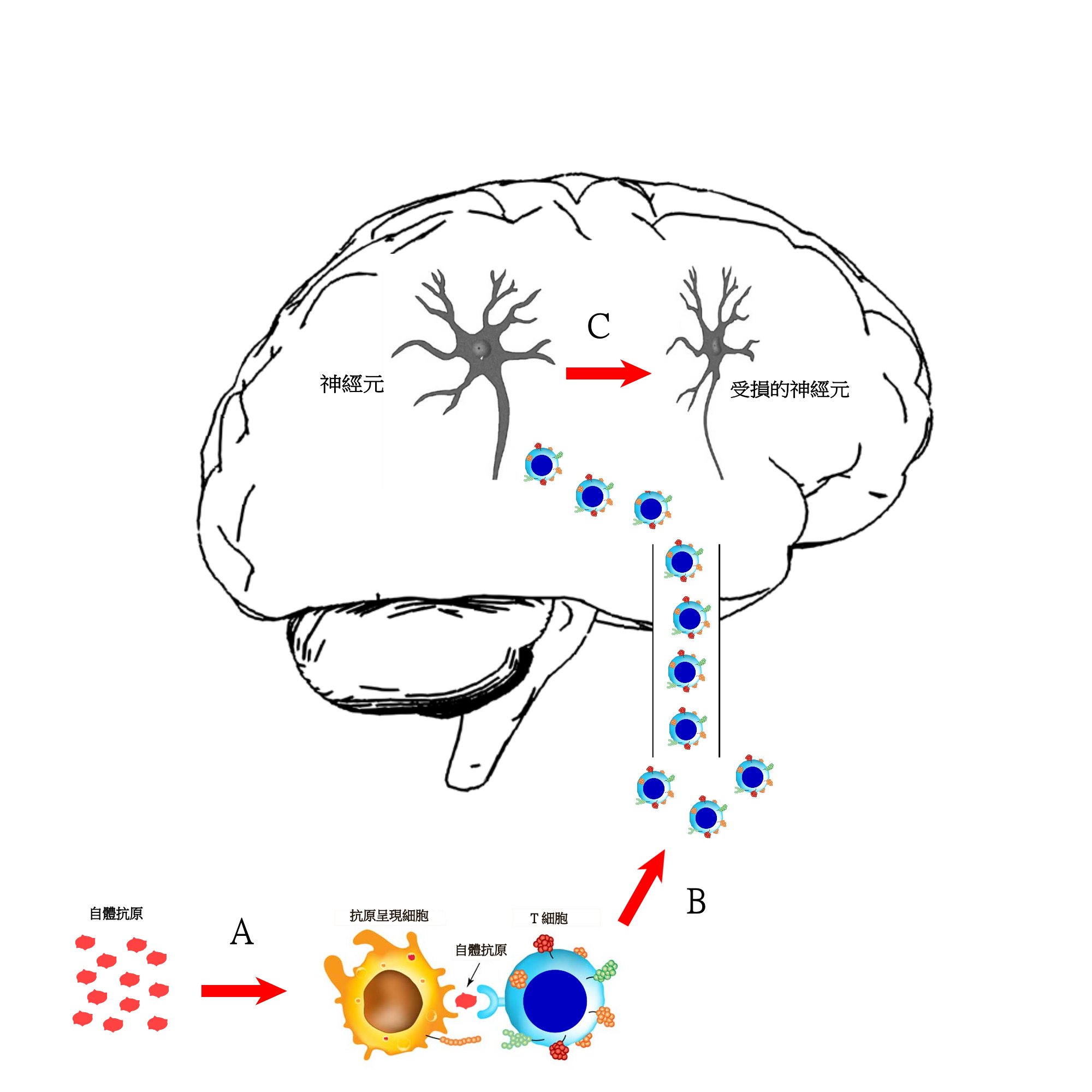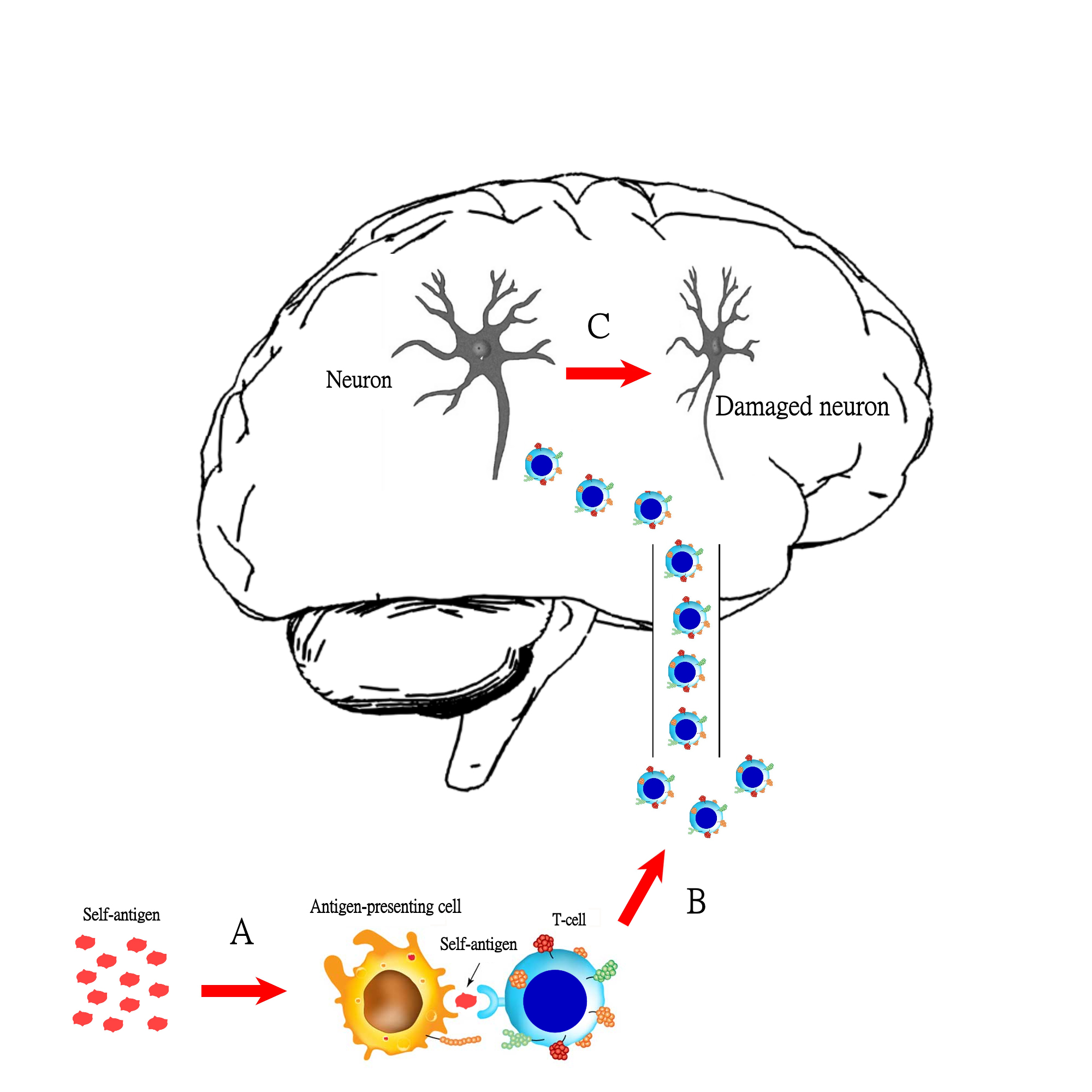阿茲海默症是目前最常見的失智症且是一種很複雜的中樞神經系統疾病,成因至今尚不明確。慢性神經發炎被認為是造成阿茲海默症的一項重要致病因子而人類白細胞抗原(HLA)基因則是與慢性神經發炎相關的重要基因。但目前對HLA基因型的深入研究仍然缺乏,可能的原因是HLA基因組區域中的高度多態性和複雜結構使得研究困難。以前,中樞神經系統被認為是一個可以豁免免疫影響的部位,但最新的研究顯示淋巴和膠淋巴系統能夠排出中樞神經系統衍生的抗原並引發相關的免疫反應。這些自體抗原可以排出到中樞神經系統外的淋巴結,並透過抗原呈現細胞呈現給T細胞。因此,HLA基因分型結合自體抗原呈現有潛力可以當作阿茲海默症的生物標記。然而,之前由於HLA區域中非常複雜的基因組變異,難以對HLA做非常精細的基因分型和研究以HLA基因分型為基礎的自體抗原呈現。現在我們已可以使用次世代定序儀(Next
Generation Sequencing- NGS)來建立HLA精細的基因分型並利用全外顯子定序的技術來獲取以HLA基因分型為基礎的自體抗原呈現數據。我們的研究團隊利用以上的分析技術發現,阿茲海默症病人HLA自體抗原的呈現量,跟阿茲海默症發病的早晚顯著相關,早發型阿茲海默症的自體抗原呈現量明顯高於晚發型阿茲海默症。這樣的結果不但支持自體抗原的呈現在阿茲海默症等神經退化性疾病中有著重要角色這樣的假設,也證實了HLA自體抗原呈現量的確具有潛力作為阿茲海默症發病早晚的生物標記。我們的研究成果可替從事相關研究的學者提供研究阿茲海默症治療目標或致病機轉的參考,並有助於精準醫學的發展,對開發用於阿茲海默症風險篩檢,預防,預後評估之生物標記,以及免疫治療藥物的醫療相關技術有所貢獻。
 自體抗原在慢性神經退化中的角色
自體抗原在慢性神經退化中的角色 A. 自體抗原經由抗原呈現細胞活化T細胞
B. 具中樞神經系統抗原特異性的T細胞經由脈管系統進入大腦
C. T細胞引發免疫神經發炎反應造成神經元受損
本校主要研究者之簡介:
黃柏穎主治醫師/助理教授
研究聯繫Email:u99802003@gmail.com
期刊出處: Transl Psychiatry. 2020;10(1):146.
研究全文下載: https://www.nature.com/articles/s41398-020-0826-6
Alzheimer's disease is the
most common dementia and a very complicated central nervous system (CNS)
disease. The etiology is still unclear. Chronic neuroinflammation is considered
to be an important pathogenic factor for Alzheimer's disease, and human leukocyte
antigen (HLA) genes are important genes associated with chronic
neuroinflammation. However, there is still a lack of advanced research on HLA
genotypes. The possible reason is that the high polymorphism and complex
structure in the HLA genome region make research difficult. Previously, the
central nervous system was considered to be a site that can be exempted from
immune influence, but the latest research shows that the lymphatic and glial
lymphatic system can excrete central nervous system-derived antigens and
trigger related immune responses. These self-antigens can be excreted to lymph
nodes outside the central nervous system and presented to T cells through
antigen presenting cells. Therefore, HLA genotyping combined with self-antigen
load has the potential to be used as a biomarker for Alzheimer's disease.
Previously, due to the very complex genomic variation in the HLA region, it was
difficult to perform very precise genotyping of HLA and study the presentation
of self-antigens based on HLA genotyping. Now we can use Next Generation
Sequencing (NGS) with whole exome sequencing technique to establish HLA fine
genotyping and obtain self-antigen load data. We used the above techniques and
found that self-antigen load is associated with the onset of Alzheimer's
disease and self-antigen load of early-onset Alzheimer's disease is
significantly higher than that of late-onset Alzheimer's disease. Such results
not only support the hypothesis that the presentation of self-antigen plays an
important role in Alzheimer’s disease, but also confirm that the presentation
of self-antigen does have the potential as a biomarker for the onset of
Alzheimer’s disease. Our results can also provide useful information regarding
target therapy or pathogenic mechanisms research of Alzheimer’s disease, and
contribute to the development of precision medicine.

The role of self-antigens in chronic neurodegeneration
A. Self-antigens activated T-cells
through antigen-presenting cells
B. CNS-antigen-specific T-cells
enter the brain through the vasculature system
C. T-cells
induce neuroinflammation which further damages the neuron
Main researcher Intro.
Poyin Huang
Neurologist /Assistant Professor
Author Email
u99802003@gmail.com
Paper cited from:
Transl Psychiatry. 2020;10(1):146.
Research Paper available online on website

